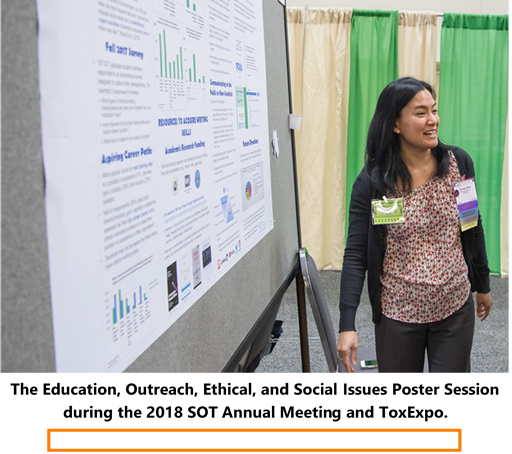
Toxicological education happens inside and outside the classroom, from teaching Girl Scouts about toxic agents in their homes at annual “TechnoQuest” events or talking about how human health risk guidelines are determined at a continuing education course for the general public. It takes some time and effort to organize these educational activities, and honestly, sometimes these activities flop for one reason or another. But sometimes they don’t!
 The focus of the Education, Ethical, Legal, and Social Issues (EELSI) Poster Session at the SOT Annual Meeting is on educational activities that focus on toxicological education in a broad sense; past topics have included learning objectives for undergraduate courses, science outreach/school partnerships/risk communication, affordable toxicology laboratory activities, summer research experiences for high school and undergraduate students, active learning and problem-based learning in toxicology, career development training programs, and translating toxicology to the public. In addition, SOT welcomes abstracts addressing issues of equity and inclusion, such as the impact of diversity on research quality and productivity and evidence-based approaches to improving recruitment and retention.
The focus of the Education, Ethical, Legal, and Social Issues (EELSI) Poster Session at the SOT Annual Meeting is on educational activities that focus on toxicological education in a broad sense; past topics have included learning objectives for undergraduate courses, science outreach/school partnerships/risk communication, affordable toxicology laboratory activities, summer research experiences for high school and undergraduate students, active learning and problem-based learning in toxicology, career development training programs, and translating toxicology to the public. In addition, SOT welcomes abstracts addressing issues of equity and inclusion, such as the impact of diversity on research quality and productivity and evidence-based approaches to improving recruitment and retention.
These types of abstracts have a slightly modified set of directions, as they are “studies that do not describe laboratory or field experiments, such as reports on educational, ethics, legal, or social initiatives.” In this case, please follow the SOT abstract directions and:
- Describe the research or assessment approach instead of experimental procedures
- Summarize the study’s results or findings explicitly
- Clearly articulate implications for the target audience(s)
- Clearly describe the impact on the practice of toxicology and/or risk assessment if abstracts are describing new initiatives or science policy in the regulatory community
To write an effective education abstract, we recommend that you identify the activity and its connection to toxicology; describe how the activity informs, or is informed by, literature or national calls to action; define the population(s) being served; describe learning outcomes/objectives for the activity and the details of the activity that can inform other practitioners and/or educators; and explain the effectiveness of the activity being evaluated.
If you would like comments before you submit, please contact the designates from the SOT Faculty United for Toxicology Undergraduate Recruitment and Education (FUTURE) Committee or the Education and Career Development Committee (ECDC).
- EELSI Abstract Consultation:
If you are already the presenting author on a research poster, consider including a graduate student or colleague in the development and presentation of the EELSI poster.
Visit the 2020 SOT Annual Meeting website for more information or to submit your abstract.

